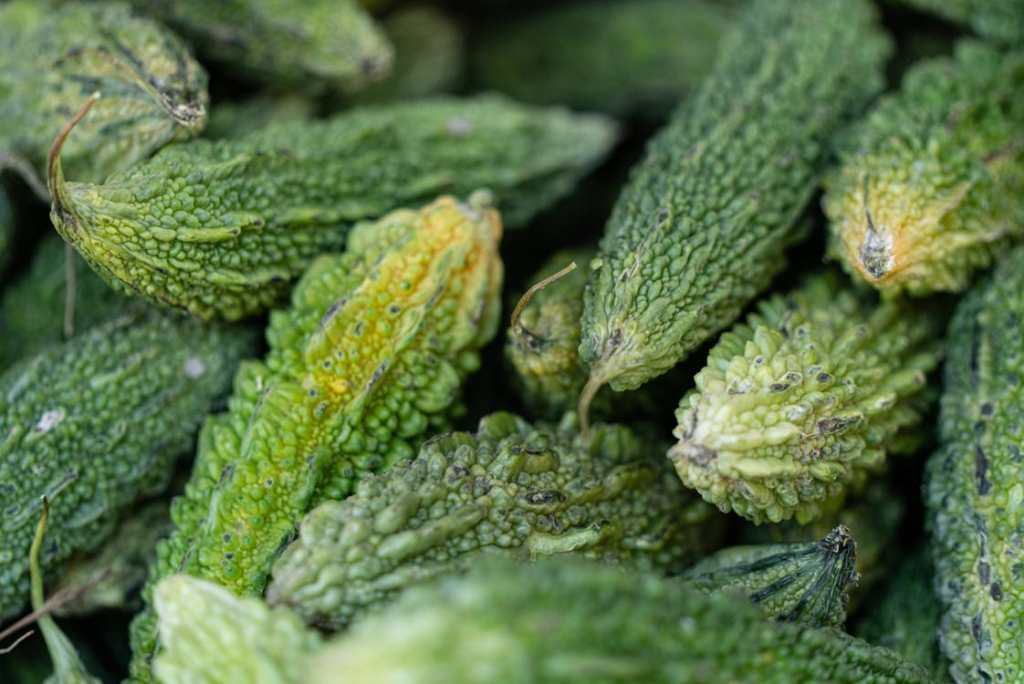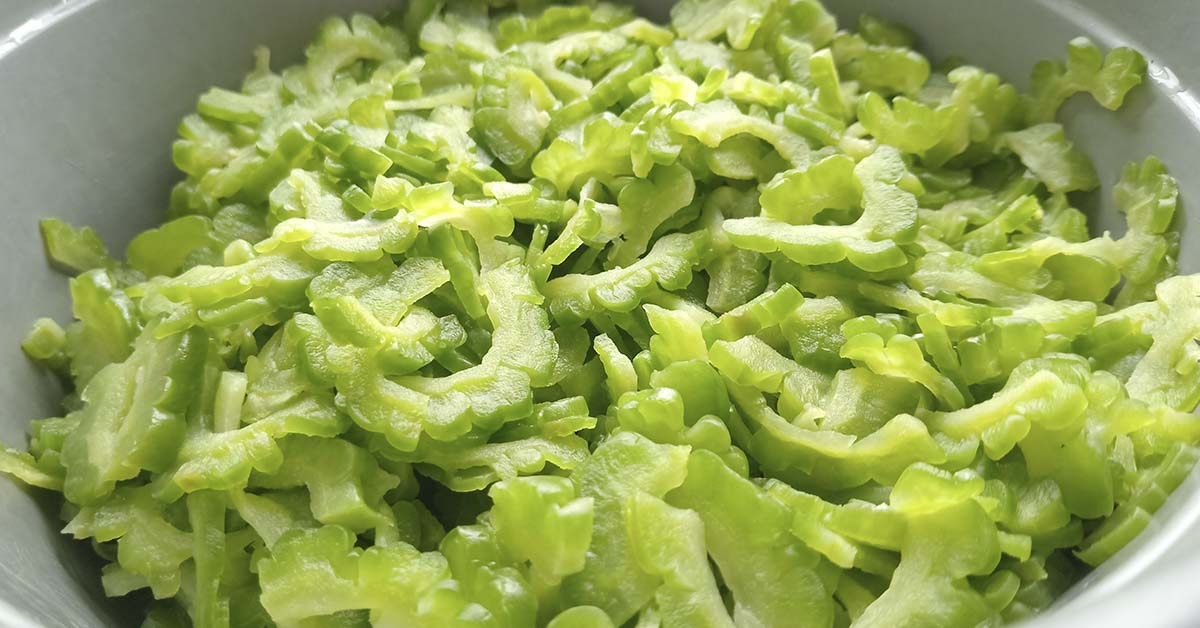Bitter melon, also known as bitter gourd or Momordica charantia, belongs to the squash family. This tropical vine produces oblong, green fruits with bumpy exteriors that resemble cucumbers. The plant grows naturally in India and other Asian countries. People cultivate it globally for its fruit, which is a staple in many types of Asian culinary dishes.
Two main varieties exist worldwide. The Chinese variety appears long and pale green with wart-like bumps covering its surface, looking like a shriveled cucumber. The Indian variety features a narrower shape with pointed ends and rough, jagged spikes on the rind. It is also dark green and stouter than its Chinese counterpart. Besides various culinary uses for its distinct, sharp flavor, bitter melon has been purported to offer several different health benefits.
Blood Sugar Control and Diabetes Management

For ages, bitter melon has been used by indigenous cultures globally to help treat blood sugar related conditions. Bitter melon is high-fiber, low-sugar containing fruit with natural compounds that act like insulin to help regulate blood sugar levels. These compounds improve how your body uses sugar in tissues and promote insulin secretion. Research shows promising results for people with prediabetes and type 2 diabetes.
A 12-week study with prediabetic participants found that bitter melon extract decreased glucose levels after oral glucose tolerance tests. The extract significantly reduced glucagon levels, which helps explain its blood sugar-lowering effects. Another study showed that 2,000 mg daily reduced hemoglobin A1c levels over 12 weeks.
However, as promising as the results are, scientists have emphasized the need for more conclusive and rigorous studies. The FDA has not approved bitter melon as a medication for treating diabetes.
Read More: Benefits of Getting Enough Vitamin K2 in Your Diet
Rich in Essential Nutrients

Bitter melon packs impressive nutritional value into a low-calorie package. 100 grams of raw bitter melon provides only 21 calories but delivers substantial nutrients. The fruit contains 0 fat and minimal sodium while offering significant vitamin content such as vitamin A and C.
Vitamin C stands out as bitter melon’s most abundant nutrient. A half-cup serving provides 42 mg of vitamin C, representing 56% of the Daily Value (DV). This antioxidant vitamin supports immune function, collagen production, and wound healing. The fruit also contains vitamin A, which supports vision and skin health. Additional minerals include calcium, magnesium, potassium, iron, and zinc. These minerals help maintain healthy teeth, bones, blood cells, and support brain and muscle function.
Digestive Health Support

Bitter melon promotes healthy digestion and can be a good addition to a weight loss diet. It is low in calories and contains natural compounds that stimulate gastric juice production and enhance liver bile fluid production. These bile fluids are essential for proper fat metabolism and digestive processes.
The high fiber content in bitter melon supports regular bowel movements and prevents constipation. Fiber passes through the digestive system slowly, promoting feelings of fullness. Traditional medicine has used bitter melon to treat stomach pains and ulcers for centuries. Recent research discovered that bitter melon can help fight Helicobacter pylori bacteria. This bacterium contributes to ulcer formation in the stomach.
Read More: The Health Benefits of Mint and How to Use It Every Day
Cancer-Fighting Properties

Research suggests bitter melon contains bioactive compounds with cancer-fighting potential. Laboratory studies show that high concentrations of bitter melon extract effectively treat various cancer cell types. These include stomach, colon, lung, and nasopharynx cancer cells in test tubes.
The fruit contains powerful antioxidants like beta-carotene, which converts to vitamin A in your body. Research links both beta-carotene and vitamin A with prevention of non-Hodgkin’s lymphoma. These antioxidants protect against cancer by preventing cellular damage.
Bitter melon extract has shown effectiveness against breast cancer cells in laboratory studies. The extract successfully inhibited tumor growth in triple-negative breast cancer mouse models. However, scientists stress that more human studies are needed to confirm these effects.
Heart Health and Cholesterol Management

Heart disease ranks as the leading cause of death in the United States. Bitter melon may help reduce several risk factors associated with cardiovascular disease. These include high cholesterol, diabetes, obesity, and high blood pressure.
Japanese researchers conducted a randomized, placebo-controlled trial with 43 adults. Participants received either 100 mg of bitter melon extract or placebo 3 times daily for 30 days. The bitter melon group experienced a large decrease in LDL “bad” cholesterol levels compared to placebo. However, a 2020 study found no significant changes in body weight, blood pressure, or HDL “good” cholesterol after administering bitter melon supplements.
While research has yielded mixed results, researchers believe bitter melon might potentially reduce LDL cholesterol levels. More robust and rigorous study needs to be done to determine the efficacy and consistency of bitter melon.
Read More: 7 Possible Benefits of Taking a Daily Turmeric-Ginger Shot
Weight Management Support

Bitter melon offers several properties that support healthy weight management. The fruit contains only 17 calories per 100 grams while providing substantial fiber content. This combination helps promote feelings of fullness while limiting calorie intake.The fiber in bitter melon slows digestion and helps control appetite. This makes it an excellent addition to weight loss diets.
The fruit also enhances metabolism, supporting efficient calorie burning and healthy weight maintenance. Studies suggest bitter melon may reduce body fat percentage and waist measurements. However, scientists emphasize that larger, longer-term studies are necessary to confirm these weight management benefits.
How to Consume Bitter Melon

Bitter melon can be prepared and consumed in various ways. Fresh bitter melon requires washing and lengthwise cutting before removing the seeds from the center. Cut the fruit into thin slices for cooking or eating raw.
The fruit works well in stir-fries, soups, and curry dishes. You can stuff bitter melon with ground meat and vegetables or sauté it with tomatoes and onions. Juicing bitter melon with other fruits helps mask its bitter taste while still having all the nutritional benefits.
Bitter melon supplements are available as liquids, powders, and tablets. The typical dosage ranges from 50 to 100 milliliters of fresh juice daily. Some studies have used doses of 2,000 mg of extract daily with positive results.
Read More: 10 Benefits of Eating Cashews Everyday
Safety Considerations and Side Effects

Bitter melon is generally safe for most people when consumed in moderate amounts for up to 3 months. However, certain individuals should avoid or limit consumption. Pregnant women should never use bitter melon as it can cause uterine contractions and miscarriage. People with liver or kidney disease should avoid bitter melon due to its complex fiber content. Those with G6PD deficiency should also avoid consumption
People taking diabetes medications should exercise caution when consuming bitter melon. The combination might cause blood sugar levels to drop dangerously low and be fatal. Always consult healthcare providers before adding bitter melon to your diet if you currently take blood sugar medications.
Common side effects include abdominal discomfort, heartburn, constipation, diarrhea, and nausea. Some people experience dizziness, headaches, or low blood sugar symptoms. Rare but serious effects include severe hypoglycemia, coma, and seizures. Always consult a healthcare professional before adding any supplement to your regime, especially if you are part of vulnerable populations.
Disclaimer: This information is not intended to be a substitute for professional medical advice, diagnosis or treatment and is for information only. Always seek the advice of your physician or another qualified health provider with any questions about your medical condition and/or current medication. Do not disregard professional medical advice or delay seeking advice or treatment because of something you have read here.
Read More: Ten Science-Backed Herbs and Supplements to Help Lower Your Blood Sugar Naturally

